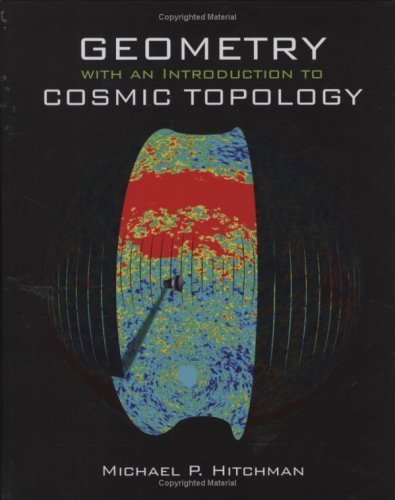
Geometry with an Introduction to Cosmic Topology
by Mike Hitchman
2017
Number of pages: 177
Description:
This text develops non-Euclidean geometry and geometry on surfaces at a level appropriate for undergraduate students who have completed a multivariable calculus course and are ready for a course in which to practice habits of thought needed in advanced courses of the undergraduate mathematics curriculum. The text is also suited to independent study.
Download or read it online for free here:
Download link
(2.3MB, PDF)
Similar books
 Hyperbolic Geometry
Hyperbolic Geometryby J.W. Cannon, W.J. Floyd, R. Kenyon, W.R. Parry - MSRI
These notes are intended as a relatively quick introduction to hyperbolic geometry. They review the wonderful history of non-Euclidean geometry. They develop a number of the properties that are particularly important in topology and group theory.
(10693 views)
 The Elements Of Non-Euclidean Geometry
The Elements Of Non-Euclidean Geometryby Julian Lowell Coolidge - Oxford At The Clarendon Press
Chapters include: Foundation For Metrical Geometry In A Limited Region; Congruent Transformations; Introduction Of Trigonometric Formulae; Analytic Formulae; Consistency And Significance Of The Axioms; Geometric And Analytic Extension Of Space; etc.
(12079 views)
 The Elements of Non-Euclidean Plane Geometry and Trigonometry
The Elements of Non-Euclidean Plane Geometry and Trigonometryby Horatio Scott Carslaw - Longmans, Green and co.
In this book the author has attempted to treat the Elements of Non-Euclidean Plane Geometry and Trigonometry in such a way as to prove useful to teachers of Elementary Geometry in schools and colleges. Hyperbolic and elliptic geometry are covered.
(9542 views)
 Non-Euclidean Geometry: A Critical and Historical Study of its Development
Non-Euclidean Geometry: A Critical and Historical Study of its Developmentby Roberto Bonola - Open Court Publishing Company
Examines various attempts to prove Euclid's parallel postulate - by the Greeks, Arabs and Renaissance mathematicians. It considers forerunners and founders such as Saccheri, Lambert, Legendre, Gauss, Schweikart, Taurinus, J. Bolyai and Lobachewsky.
(9795 views)